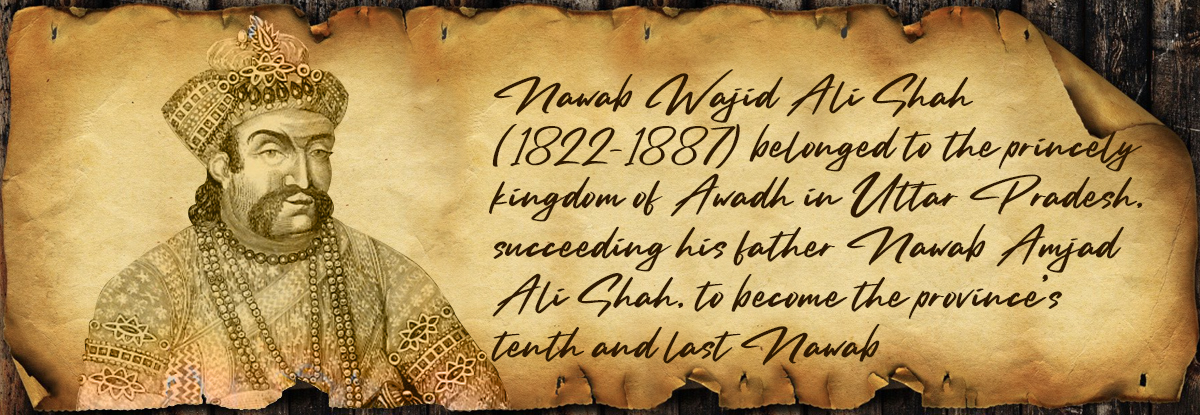NAWAB WAJID ALI SHAH
NAWAB WAJID ALI SHAH (1822-1887) BELONGED TO THE PRINCELY KINGDOM OF AWADH IN UTTAR PRADESH, SUCCEEDING HIS FATHER NAWAB AMJAD ALI SHAH, TO BECOME THE PROVINCEʼS TENTH AND LAST NAWAB
After his kingdom was annexed by the British in 1856, the Nawab was exiled to Calcutta where he lived the rest of his life on a generous pension in Garden Reach, Metiabruz. He was a poet, playwright, composer, and dancer, under whose lavish patronage the fine arts flourished. His personal life was also as ambitious as his passion for the arts, as he took advantage of the Shia Law of Muta to marry an astonishing 359 times!However, his immense contribution to the field of fine arts is what makes him renowned today.
Pursuing his passion for the arts, Wajid Ali built the spectacularKaisarbagh Baradari palace complex which came alive with music, dance-dramas, Rahas, JogiyaJashan, and Kathak performances, making Lucknow an attractive cultural centre. It was during his era that several reputed musicians, poets, composers and dancers enhanced their repertoire, along with enriching the light classical form of thumri. The grand revival of the Kathak dance form, and the rise in popularity of Hindustani Theatre is also attributed to Wajid Ali.
After his deposition to Calcutta, the Nawab longed to keep the pomp and splendour of his beloved Lucknow alive. In his exile at Metiabruz, on the banks of the River Hooghly, Wajid Ali once again used his wealth to relive his former glamorous lifestyle. The adorned walls of the Darbar Hall of Metiabruz bear witness to the numerous musical assemblies held there, being visited by music-lovers, including great personalities from Kolkataʼs music circuit such as Aghorenath Chakravarty, Sajjad Mohammad, Dhirendranath Bose, Shyamlal Goswami and Rai Chand Boral.
Wajid Ali Shah was a prolific writer and wrote extensively in a simple language – which included a little Awadi – that was easily understood by everyone. Wajid Ali’s works included numerous poems, prose, ragas, plays and ghazals under his pen name, Qaisar. While his compositions include his famous Bhairavi thumri named Babul Mora NaiharChhooto Ri Jaaye, his ragas, dramatised poems, and ghazals have inspired many artistes and playwrights.
While it was common for kings to employ poets to write on their behalf, this was not true of Wajid Ali who wrote every word himself. It is estimated that he wrote over 60 books but most of his works are not available. One of his most important works is the autobiographical Huzn-i-Akhtar, which contains nearly 1276 couplets and is a record of the hazardous journey he undertook from Lucknow to Calcutta, after relinquishing his crown. His work, Sawat-ul-Qalub, runs into 1061 pages and comprises a collection of 44,562 couplets, and was completed in three years. Bani is 400 pages long, and is a treatise to music and dance.

